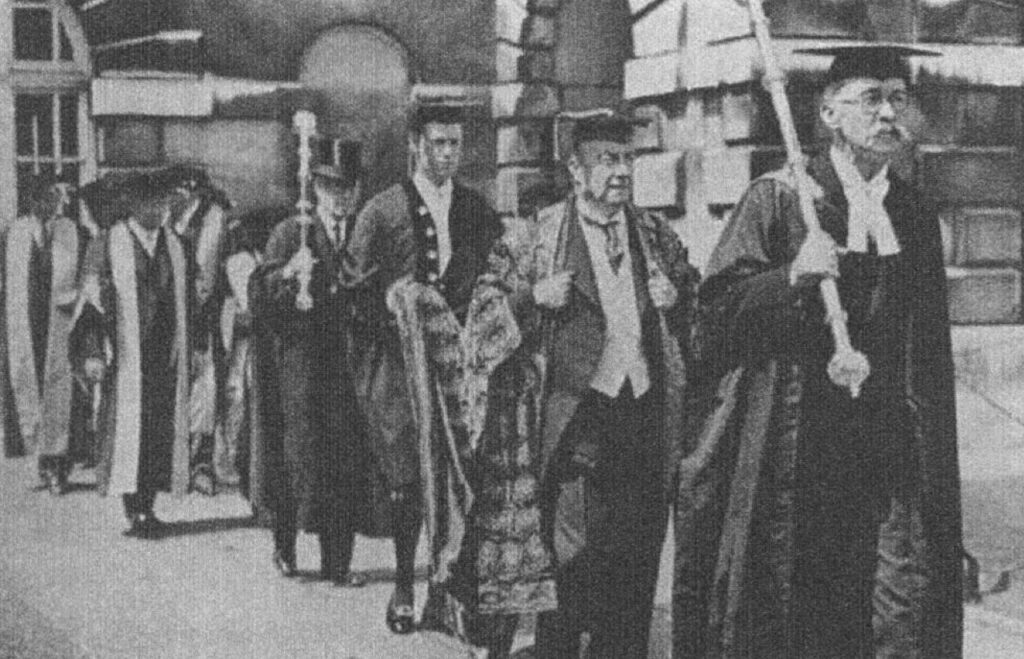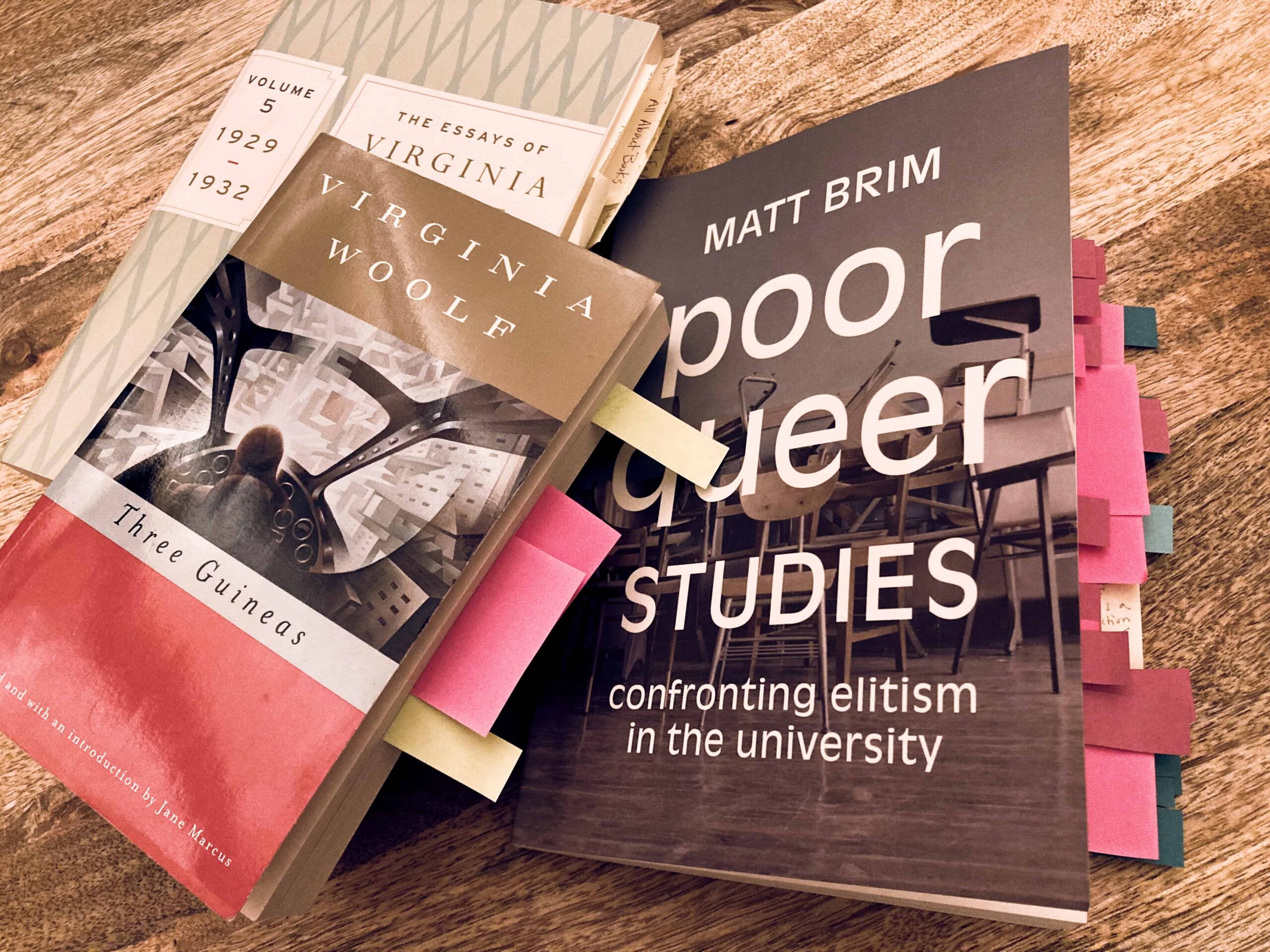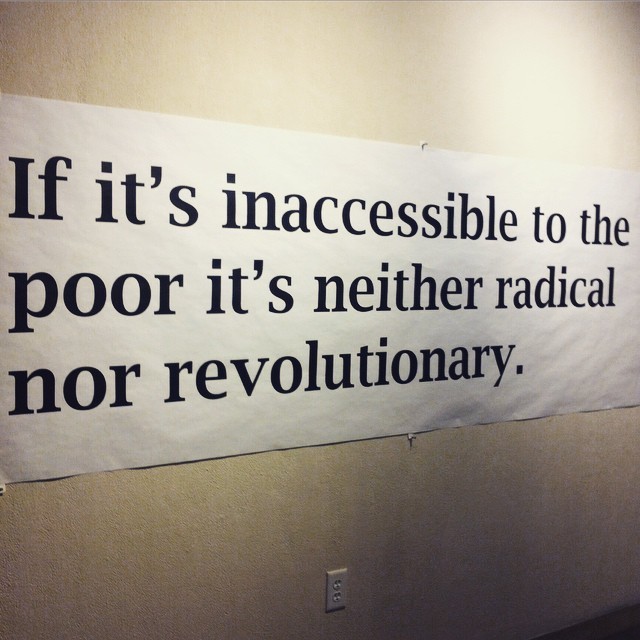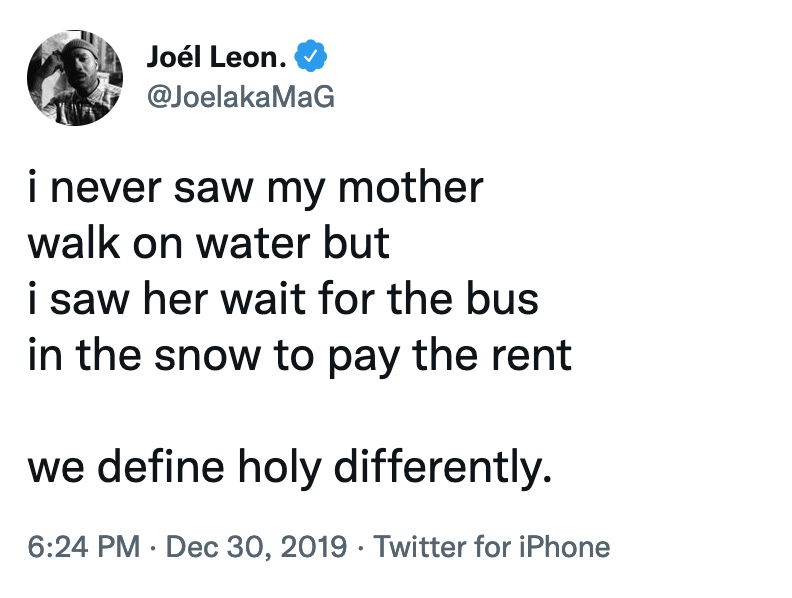At this year’s MLA Convention, I am honored to be on a panel devoted to “Woolf’s 21st Century Academia”, a panel sponsored by the International Virginia Woolf Society.
My presentation, “Poor Queer Studies for a Society of Outsiders” positions Woolf’s Three Guineas alongside Matt Brim’s Poor Queer Studies. However, once I really got into it, realized I had far more material than we had time for, and I ended up cutting what I had prepared in half (already having cut it way back from my original plan). Obviously, the topic is one about which I have plenty to say!
Therefore, I offer here the longer draft of my remarks. I do not know if I will have the time or opportunity to develop this material more fully, but I put it here in case it is of use to anyone else as a jumping off point. (As with everything on this site, it is Creative Commons licensed, so please don’t hesitate to do with it whatever you want that’s noncommercial. For anything more than that, just ask.)
Poor Queer Studies for a Society of Outsiders
by Matthew Cheney
Matt Brim’s recent book Poor Queer Studies: Confronting Elitism in the University begins with a quotation from Virginia Woolf’s A Room of One’s Own: “One cannot think well, love well, sleep well, if one has not dined well,” and then summarizes the context, wherein Woolf compares the dull, basic meals served to the women at Fernham with the rich, fulfilling meals served to male students at Oxbridge (Brim 1-2). He then compares Woolf’s passage to an experience of his own, the experience of teaching a dinner-time Queer Studies course at the College of Staten Island, part of the City University of New York system, an experience that included meals of potato chips and candy bars from vending machines, meals eaten by students hurrying to class from jobs and families, meals eaten while everyone moves from one classroom to another, looking for a projector that works so they can review and discuss the evening’s text, the acclaimed Black queer film Moonlight. He then introduces the topic of his book:
If Queer Studies has over the past thirty years successfully argued, elbowed, and snuck its way into the academy so that its courses can be found in both likely and unlikely places—not only at our Oxbridges and Fernhams but at our Bloomsbury Community Colleges—we might shift attention, à la Woolf, to the question of the resources with and without which queer students and professors teach and learn and write across academic work sites. (3)
Though starting from A Room of One’s Own, Poor Queer Studies fits at least as well alongside Woolf’s 1938 book Three Guineas and some of her other writings on education, even as Woolf’s primary concern is pacifism and the gender inequalities in higher education in Britain, while Brim’s book excavates the ways ostensibly progressive fields such as Queer Studies benefit from and replicate the flagrantly unequal power structure of U.S. higher education. During our time today, I will focus on how lines of thought in Three Guineas might inform the arguments, analyses, and proposals in Poor Queer Studies, offering us all some tentative paths forward at a time when both education and society are in crisis.
First, following Brim’s lead and, to some extent, Woolf’s, I must highlight my own situation and experience, because it is such experience — the experience of workers at a school that is not wealthy, not a flagship, not prestigious — that, though it is the experience of the majority of faculty, staff, and students in the United States, does not often get represented in the public imagination. I am an assistant professor at a regional state university in a state that has a long tradition of laissez-faire politics, which is to say, a state that does not, fundamentally, believe in public goods. In terms of per capita funding of higher education, New Hampshire is, in most reckonings, either at the bottom or among the bottom five states. In terms of tuition, ours are some of the most expensive public colleges and universities in the country, and our students graduate from our public schools with some of the highest debt. At my university, faculty and staff are the lowest paid in the University System, we are chronically under-staffed, our buildings suffer from continually deferred maintenance, and even our austerity-minded administrators morbidly laugh when they tell us, yet again, to do more with less. We aren’t cut to the bone anymore; the bones are broken, crushed, and marrowless. And there are plenty of schools in tougher shape than my own.
In Three Guineas, Woolf herself uses the language of poor colleges vs. rich colleges — the poor colleges in her world were the colleges for women, the rich colleges were the institutions that educated men. In both Brim and Woolf’s books, these schools are made poor by the ways their societies prioritize and structure educational hierarchies. It is hard not to believe that, consciously or unconsciously, people of power, wealth, and prestige desire the poverty of these schools — that, like the suffering child in Ursula Le Guin’s story “The Ones Who Walk Away from Omelas”, the poverty of these schools in fact is a precondition for all the things people value and celebrate about rich schools.
The students who attend poor schools are not seen by society, or at least the educational power-brokers, as serious, worthy, or deserving of better. If they were, the system would be different. In 1930s Britain, the educational powers-that-be clearly believed that wealth would be wasted on women; in the present United States, governments, institutions, and wealthy donors clearly believe that the kinds of people who study and work at regional state schools, at community colleges, and even at big but woefully underfunded public schools simply don’t need the resources of a Harvard, Yale, Dartmouth, Stanford, Duke. If the powers that be thought that education ought to be open to everyone who desires it, and ought to be well resourced, then they would do unthinkable things like tax the endowments of these places that have essentially become hedge funds with universities attached; instead of giving more money to those hedge funds, they would donate their spare wealth to schools like mine; and, perhaps most unthinkable of all, they would insist that wealthy schools significantly increase the percentage of applicants they accept, and would work to shift our cultural consciousness away from venerating the “highly selective” — a program of eugenics more than of democracy — and would instead celebrate the institutions that teach the broadest, most diverse populations of students. If as a society we actually valued democratic education, then we would see the continued existence of the rich schools, in their current form at least, as a shameful indictment of our failures.
In Three Guineas, Woolf is primarily concerned with the question of how to end war. The dominant narrating voice of Three Guineas seeks to figure out how to donate her money — her three guineas — so as to bring peace. She discusses education in response to an appeal for money from an “honorary treasurer” who is “asking for money with which to rebuild a women’s college” (28). How might we, Woolf wonders, create schools that teach students to hate war? How might we disentangle educational institutions from war-making? Her initial impulse is to say: Burn it all down. Walk away from Omelas. It is absurd for women to ask for entrance into fundamentally patriarchal institutions. For anyone not indoctrinated into their customs and values, those institutions are strange, alien places, places of inevitable inequity. They will do us, the peaceful outsiders, no good. After all, if education were capable of teaching people to hate force and detest war, the world we live in would be quite different. Yet the facts of history prove, Woolf says, “that education, far from teaching the educated generosity and magnanimity, makes them on the contrary so anxious to keep their possessions … in their own hands, that they will use not force but much subtler methods than force when they are asked to share them” (38). (Woolf knew this to be true even without having attended a faculty meeting.) The basic values of the university, its processes and traditions, all encourage the kinds of emotions and desires that fuel war — so what good is it for someone who desires to end war?
We could say the same for our current educational reality in America, whether about war or innumerable other injustices. Matt Brim points this out with Queer Studies as his model. As a field, Queer Studies loves the rebel pose, loves to cosplay revolutionary transgression while its most prominent scholars breathe deep the rarefied air of some of the wealthiest institutions on the planet. And yet if we look at the actual achievements of the field, it doesn’t really seem that the democratization of education is a central goal. If it is, then our work has some big questions to answer about itself. Brim writes:
If the disruptive democratization of higher education has been Queer Studies’ goal, dating back perhaps to the first conference of the Gay Academic Union in 1973, we have since failed. With notable exceptions, the field of Queer Studies as an academic formation has been and is still defined and propelled by the immense resources of precisely those institutions of higher education that most steadfastly refuse to serve representative numbers of poor students and to hire faculty without high-status academic pedigrees. (9)
Judged by its institutional practices, Queer Studies, like many — maybe most — academic disciplines simply does not want the grubby poor, the rough-around-the-edges students, or the people like me, the graduates of programs without international prestige. Because the engines of prestige and honor for most disciplines are housed within wealthy institutions, those disciplines inevitably serve the ideology of those institutions, which is to support and maintain the hegemony that allows those institutions to hoard their wealth, promote their prestige, and replicate inequalities. If a wealthy school creates a multi-million dollar center to attract one famous scholar, it is quite something for that famous scholar to then pretend to be a radical.
Woolf knew this. It is why the first impulse in her discussion of colleges is to say to hell with them. Her first impulse is toward destruction. This guinea, she wants to tell the honorary treasurer, should be earmarked: “‘Rags. Petrol. Matches.’ And this note should be attached to it. ‘Take this guinea and with it burn the college to the ground. Set fire to the old hypocrisies. Let the light of the burning building scare the nightingales and incarnadine the willows. And let the daughters of educated men dance round the fire and heap armful upon armful of dead leaves upon the flames. And let their mothers lean from the upper windows and cry, “Let it blaze! Let it blaze! For we have done with this education!”’” (45).
Quickly, she admits that this is more emotion than practicality. It is a hollow statement, a rage from a wound. We need universities, we need education, and we need them for practical reasons — if any marginalized person is to have a hope of escaping the manifold oppressions the world sends their way, they must have some education to be able to do so. Thus, while it is imperative to recognize that the situation has led us to want to set fire to all, to blow it all up and dance around the flames, when we stop and reflect and cool down a bit, we know that what we really need are practical steps forward. Woolf offers a few toward her goal of teaching people to hate war: we teachers can, she says, “refuse to teach any art or science that encourages war. Further, we can pour mild scorn upon chapels, upon degrees, and upon the value of examinations. … If we are asked to lecture, we can refuse to bolster up the vain and vicious system of lecturing by refusing to lecture. And of course, if we are offered honors and degrees for ourselves we can refuse them” (46). Scorn, but mild. No rags, petrol, and matches, but refusal. Stand on the outskirts of Omelas and ferry food to the miserable child in the basement. The sad fact is, Woolf concludes, “we must help to rebuild the college which, imperfect as it may be, is the only alternative to the education of the private house. We must hope that in time that education may be altered” (49).

Brim, too, ends up with practical goals. While his book begins as polemic — and a very necessary polemic — it soon transitions to pedagogies and practices. Brim’s idea of the queer ferry is a valuable one, as is his idea of making the undercommons a less abstract idea. Stop pretending to be Robin Hood and really be him, Brim exhorts us. If you are in a position to steal from the rich and give to the poor, do so. If you are given power and/or wealth, redistribute them.
(Redistributing the wealth of rich institutions does not necessarily mean theft or reappropriation. Here’s a recent example: Michigan State University’s libraries donated money to JSTOR to make a collection of materials devoted to HIV, AIDS, and the arts become open access in 2022. At a time when a lot of libraries are getting defunded, this commitment to helping keep knowledge open is exemplary. The MSU libraries could, I assume, have hoarded their money and built up their own collections. Instead, they have used their wealth to enrich us all.)
One of Brim’s insights is that Rich Queer Studies has some things to learn from Poor Queer Studies. His chapters on pedagogy are beautiful, and they help move us away from the abstractions of ivory tower elites and into the classrooms with broken equipment, the classrooms where students and teachers both get through night classes with sustenance from vending machines. The chapter on the place of mothers within the Queer Studies classroom ought to be required reading throughout academia. Uncertain whether you are teaching Rich Queer Studies or Poor Queer Studies? One gauge: How many times do parents need to bring their children to class because they don’t have child care for them? (For me, it’s at least once a term in my classes, often more. From the first day, I tell students that they are always welcome to bring their kids.)
Putting Woolf and Brim together opens up for us a Poor Queer Studies for a Society of Outsiders. If Three Guineas is famous, it is famous for Woolf’s proposal of outsiders as able to make and deploy community together. For Woolf, the position of outsider is an epistemological position. She says that when a soldier says, “‘I am fighting to protect our country’ and thus seeks to rouse her patriotic emotion, she will ask herself, ‘What does “our country” mean to me an outsider?’” (127). Poorness and queerness both create outsiderness. What Woolf and Brim together teach me — their linked pedagogy — is to continue to ask the question of what do all the practices of higher education, rich and poor, mean to me, a queer study-er? And then, what does Queer Studies mean to me? What might it mean?
In between wanting to burn the colleges down and offering some practical advice for things to refuse, Woolf imagined not rejecting the position of a poor college, but embracing it. The poor college, Woolf wrote, must not teach
the arts of dominating other people; not the arts of ruling, of killing, of acquiring land and capital. They require too many overhead expenses; salaries and uniforms and ceremonies. The poor college must teach only the arts that can be taught cheaply and practised by poor people; such as medicine, mathematics, music, painting and literature. It should teach the arts of human intercourse; the art of understanding other people’s lives and minds, and the little arts of talk, of dress, of cookery that are allied with them. The aim of the new college, the cheap college, should be not to segregate and specialize, but to combine. It should explore the ways in which mind and body can be made to co-operate; discover what new combinations make good wholes in human life. (43)
As excited as this vision seems to make her, Woolf breaks off. It is too much utopia too soon. It is too easily dismissed by the honorary treasurer as impossible. Better to work toward what can be done in the short term to make such a vision seem less like a dream.
Similarly, Brim ends up encouraging us to find what is specific in our situations, what teaching we might do at a local level, what ways we might continue to seek the most productively critical pedagogies, what ways we can challenge ourselves to expand our empathies and generate, to borrow a term from Kathleen Fitzpatrick, the most generous thinking.
Woolf encourages us to find new words and new methods, and to remain outsiders. “We can best help you to prevent war not by joining your society but by remaining outside your society but in cooperation with its aim” (170). Similarly, we can reinvigorate the subversive, regenerative power of Queer Studies within higher education by seeking ways to preserve our outsider status, the status that keeps us separate from the hegemonic power of wealth. We can learn from the poor — and learn that poor has many meanings. With our outsider status we can then do the work to build outsider societies that truly do reappropriate the wealth and build a more just and equitable world for us all, poor, rich, queer, and allied together.
Works Cited
Brim, Matt. Poor Queer Studies: Confronting Elitism in the University. Duke University Press, 2020.
Fitzpatrick, Kathleen. Generous Thinking: A Radical Approach to Saving the University. Johns Hopkins University Press, 2019.
Guin, Ursula K. Le. “The Ones Who Walk Away from Omelas.” The Wind’s Twelve Quarters: Stories, 1975, HarperCollins, 2017, pp. 275–84.
Woolf, Virginia. Three Guineas. 1938. Edited by Jane Marcus, Annotated ed., Harcourt, 2006.


